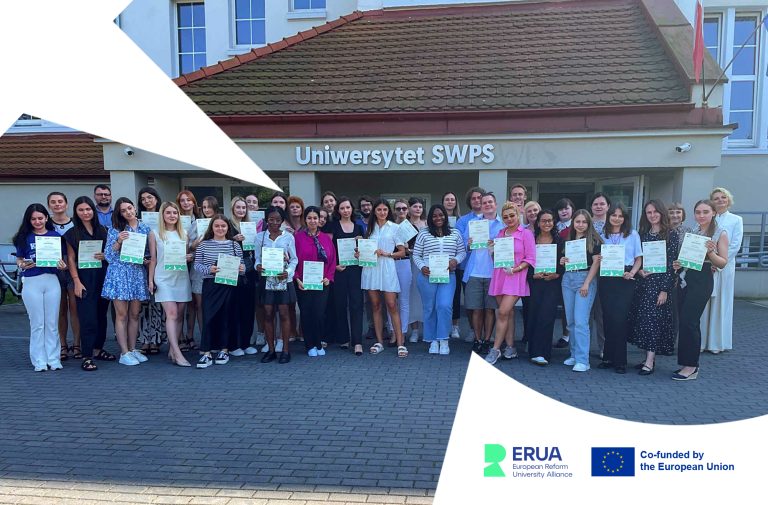For the second time, SWPS University opened doors to its Sopot campus to host the Summer School on the Rule of Law and the legislation of the European Union. This year, the event was organized in collaboration with partners from the European Reform University Alliance (ERUA) and some Polish universities. We welcomed 37 participants from Ukraine, Bulgaria, France, Germany, Greece, Italy, Lithuania, and Poland.
Foundation of the European Union
Article 2 of the Treaty on European Union (TEU) lists the values that form the foundation of the European Union. They include respect for human dignity, freedom, democracy, equality, the rule of law, and respect for human rights (including the rights of persons belonging to minorities).
The main theme of this year’s Summer School posed a questions “What is European Union? The relevance of Article 2 TEU and its analysis: Exchange of experience”. The participants discussed several related concepts such as pluralism, equality, justice, solidarity, tolerance, and non-discrimination.
Both students and lecturers had an opportunity to visit the European Solidarity Centre (ECS) in Gdańsk, devoted to the history of Solidarity, the Polish trade union and civil resistance movement, which greatly contributed to the fall of Communism in the late 1980s.
“According to the Treaty on European Union, a well-functioning system of the Rule of Law constitutes an absolutely indispensable condition for the realization of the EU’s mission. The Rule of Law also ensures that the values listed in Article 2 of TEU can flourish. The political and the economic missions of the EU, such as the common market, are rather well known. However, the values which underline the development and application of laws related, for example, to the common market or movement of people, have not been sufficiently highlighted, so far. Not much has been said about these values before the accession of Poland, and the accession of the countries from Central Europe, and not much is being said twenty years later. However, these values are both the starting point in argumentation, and a reference point for EU institutions. Therefore, an event where not only the citizens from the “old” EU, but also those from the countries, which joined in 2004, and from the future members of the EU can meet provides an ideal platform for a discussion on the meaning and importance of the European values.
A union of citizens is not possible without a common understanding, even a very broad understanding, of this union’s foundations. This is the thought that inspired the main theme of this year’s Summer School on the Rule of Law. Gathering of so many people who represented varied experience, and who came from so many different countries, could not be possible, or would be much harder to achieve, if it was not for the ERUA alliance and the collaboration with the Ukrainian universities. The success of our Summer School shows that progress is possible only if we talk to each other and work together. Both the ERUA alliance and the programs addressed to the Ukrainian universities, such as the programs financed by the Polish National Agency for Academic Exchange (NAWA), are a perfect platform for this type of initiatives.
Filip Cyuńczyk, Ph.D., Faculty of Law in Warsaw, Rector’s Representative for Student Affairs, SWPS University.
Common European Project
The second edition of the Summer School on Rule of Law was organized by the Faculty of Law in Warsaw and the Office for International Relations of SWPS University. Lectures and workshops were led by academics from SWPS University, and partner universities, such as the University of Wrocław, the University of Warsaw, New Bulgarian University, New University in Ljubljana, Slovenia, and the Academic College of Tel Aviv Yafo, in Israel.
Apart from students from SWPS University, we also hosted in Sopot students from the majority of the ERUA partner universities, including:
New Bulgarian University, Bulgaria
Aegean University, Greece
Paris 8, France
Macerata University, Italy
European University Viadrina, Germany
Mykolas Romeris University, Lithuania.
We also had the pleasure of welcoming numerous participants from several Ukrainian universities, such as:
Yuriy Fedkovych Chernivtsi National University
Ivan Franko National University of Lviv
Sumy State University
National Technical University of Ukraine
Igor Sikorsky Kyiv Polytechnic Institute
Taras Shevchenko National University of Kyiv
Lviv Polytechnic National University
“KROK” University in Kiev.
The organization of the Summer School is aligned with one of the ERUA’s goals that is led by SWPS University, i.e., the development of international educational initiatives.
The School was financed by the European Union, as part of the ERUA initiative, a donation from the Economic Freedom Foundation, and a grant from the Polish National Agency for Academic Exchange (NAWA), earmarked for the “ER-UA — Strengthening cooperation with Ukrainian universities” project.

